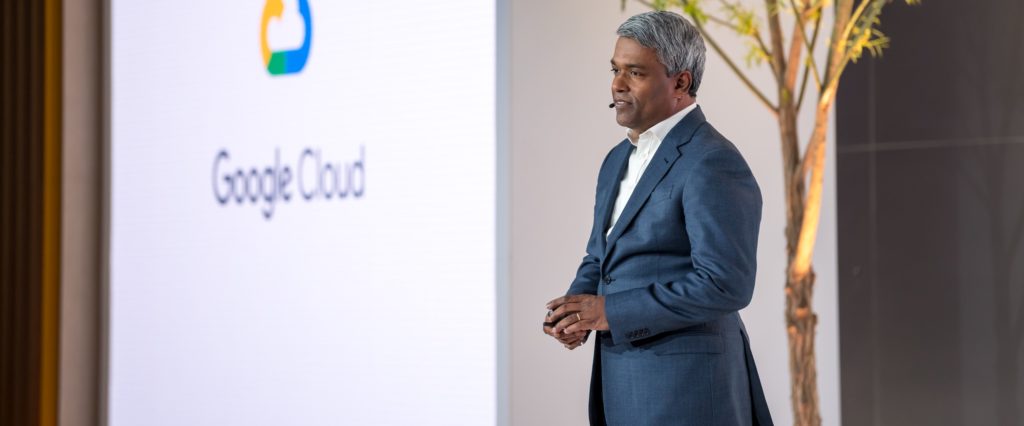Pretty much the first words from Thomas Kurian to analysts at Google Cloud Next 2019 were:
“Customer empathy – you have to understand where they are, how you can help them. Every legacy system exists for a reason. Meet customers where they are and be deeply sympathetic.”
Empathy, sympathy, legacy. All of those words map to enterprise business models and expectations, and are definitely not we traditionally expect from Google. Kurian continued:
“We’re looking at “boring” workstreams that make customers feel like Google is listening”.
Boring is good. Enterprises like boring. So what about the sales and engagement process? It has been widely reported that Kurian says he just needs to increase the size of Google Cloud’s salesforce to be more effective. I didn’t come away with this impression at all.
According to Kurian himself it’s actually about being easier to do business with.
“Don’t just measure outcomes, but look at the *pauses*. Measure how much friction there is in the sales process. How many red lines are there in the process? These things sound mundane, but focusing on eliminating the pauses helps customers understand we want their business”.
Indeed in a session with European analysts on Thursday morning Kurian said:
“Articles come out saying it’s just about growing the salesforce. that’s an oversimplification”…. it’s about investing in and improving the engagement model, including technical pre sales and solutions.”
Before moving on, one last point on sales people. While obviously throwing bodies at the problem won’t fix cultural issues, in talking to Thomas Otter, founder of Otter Advisory, he made the point that Google Cloud will find it easier to hire the world’s best account managers now, the kind of folks that can close a $100m with a Nestle. With Google previously, top sales talent were never going to get the respect from the organisation they will under Kurian, so it will be easier to hire folks with a serious track record from other enterprise companies. Kurian given his background at Oracle brings immediate enterprise credibility with both salespeople and their customers.
So what about cultural and process issues? When you’re not the incumbent supplier it’s beholden on you to be easier to work with, and in Google Cloud’s evolution this has never really been the case before. AWS is clearly customer focused, and Microsoft Azure has thrown huge resources at programs to improve customer and community engagement in the cloud era. What does it mean to be easy to work with?
Kurian said Google had worked with Disney on its resort business. By late afternoon at Disney World kids are tiring and getting grouchy (that does sound suspiciously like empathy). The project was to make it easier for kids to find the rides associated with their favourite characters, and then steer them towards retail experiences, which made a meaningful impact on sales and revenues. He also highlighted work with Walmart using Google Assistant for shopping lists before in store collection.
Kurian said that in retail what matter is:
“Convenience, convenience, convenience, convenience”.
Nice use of epizeuxis, the rhetorical trope of repetition for emphasis. If Google Cloud can bring something of that kind of focus on convenience to customer engagements it will indeed have a meaningful impact on sales. Another word that Kurian kept coming back to was “solutions”. He wants products salespeople and their customers can understand, and we’re going to see an increasingly strong vertical industry focus going forward.
From a platform perspective meeting the customer where they are comes in the shape of Anthos, Google’s new brand for its middleware offering. Anthos is positioned for on or off premises deployment, with a claim it can also run on AWS or Azure. It will be competing with the likes of Red Hat OpenShift and Pivotal Cloud Foundry. Anthos is targeted at customers that want the promise of portability, without feeling they need to stand up and manage Kubernetes and associated cloud native technologies such as Istio. My colleague Stephen goes into a more detail about Anthos in this post – What’s Next For Google?
Kurian’s focus is on key market areas, verticals and geographies. He visited 450 customers in his first 3 months at the firm. I was reminded of the Louis Gerstner playbook when he took the reins at IBM. After visiting a ton of customers in the first few months he basically came back and said: “The last thing IBM needs is a Vision”. I am not sure any particular announcement at Next is what to focus on – though Anthos is significant – but rather execution, a clearer focus on the enterprise. Google has arguably wanted customers to be a better version of themselves. Now Kurian needs to turn Google into a better version of itself – better, more engaging, easier to work with, the convenient default option. It’s about execution from here on in, if his stewardship is to pay major dividends.
You should also check out our Team Recap from Cloud Next.
My take on Google Next 2018 is also worth reading for context because it shows continuities and progress in terms of GCP’s growing enterprise focus.
Also here is my 3 minute video take on the event
Google paid our T&E for our attendance at the event.
Amazon Web Services, Microsoft, Oracle and Pivotal are all RedMonk clients.

No Comments